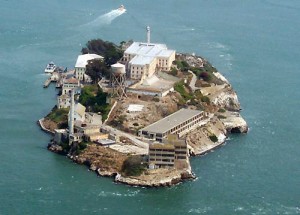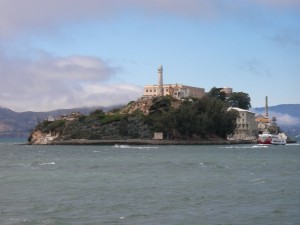claustrophobic
 On a trip to San Francisco, my husband, Bob and I took a tour of Alcatraz Prison. I expected it to be a usual touristy place, even though it had been the nation’s end of the line maximum security prison. It was where they sent the most incorrigible inmates. When we arrived, the island known as The Rock or America’s Devil Island to the inmates who did time there, really looked more like an industrial island than a prison, but you could see why it was called The Rock. Of course, that first view of the island was the last time I thought it didn’t look like a prison.
On a trip to San Francisco, my husband, Bob and I took a tour of Alcatraz Prison. I expected it to be a usual touristy place, even though it had been the nation’s end of the line maximum security prison. It was where they sent the most incorrigible inmates. When we arrived, the island known as The Rock or America’s Devil Island to the inmates who did time there, really looked more like an industrial island than a prison, but you could see why it was called The Rock. Of course, that first view of the island was the last time I thought it didn’t look like a prison.
Upon stepping inside, you felt an immediate, almost claustrophobic sensation, and I’m not claustrophobic. The cells were often painted black inside. It was a way of achieving privacy for the inmate. To me it just seemed bleak. I could imagine how it must have been…knowing that you could not leave this dark and ominous place. Alcatraz operated from the mid 1930s to the mid 1960s, and housed over 200 inmates. Well known for it’s brutal conditions, Alcatraz was thought to be inescapable due to the frigid waters of the bay. One group of prisoners either died or proved the rumors wrong, when they escaped and were never heard from again. Their fate is still unknown. The prisoners had to comply with very strict rules, and were required to live in complete silence. The first metal detectors were used at Alcatraz. No wonder the prisoners considered escape, knowing it meant almost certain death. Eventually, the conditions and treatment of the prisoners were deemed cruel and unusual punishment, and on March 21, 1963.
First explored by Juan Manuel de Ayala in 1775, it was originally called Isla de los Alcatraces, which meant  Island of the Pelicans. It was sold to the government in 1849. The first lighthouse in California was on Alcatraz. It was once a Civil War fort and then a military prison in 1907. Finally it became the maximum security prison known as The Rock. After it’s closing, a group of Sioux Indians claimed that the island belonged to them due to a 100 year treaty. Those claims were ignored until November of 1969 when a group of Native Americans representing the American Indian Movement, or AIM occupied the island. They stayed until 1971 when they were finally forced off of the island by federal authorities. The next year it was added to the Golden Gate National Recreation Area and opened for tourism. It was a very interesting tour to say the least.
Island of the Pelicans. It was sold to the government in 1849. The first lighthouse in California was on Alcatraz. It was once a Civil War fort and then a military prison in 1907. Finally it became the maximum security prison known as The Rock. After it’s closing, a group of Sioux Indians claimed that the island belonged to them due to a 100 year treaty. Those claims were ignored until November of 1969 when a group of Native Americans representing the American Indian Movement, or AIM occupied the island. They stayed until 1971 when they were finally forced off of the island by federal authorities. The next year it was added to the Golden Gate National Recreation Area and opened for tourism. It was a very interesting tour to say the least.

